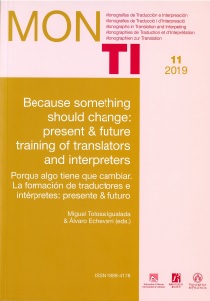From translators to accessibility managers: How did we get there and how do we train them?
Main Article Content
Abstract
Downloads
Article Details
The documents contained in these directories are included by the contributing authors as a means to ensure timely dissemination of scholarly and technical work on a non-commercial basis. It is understood that all persons copying this information will adhere to the terms and constraints invoked by each author's copyright. These works may not be reposted without the explicit permission of the copyright holder.
References
Abdallah, Kristiina. (2011) “Quality Problems in AVT Production Networks: Reconstructing an Actor-Network in the Subtitling Industry.” In: Serban, Adriana; Anna Matamala & Jean Marc Lavaur (eds.) 2012. Audiovisual Translation in Close up. Frankfurt: Peter Lang
Buzelin, Hélène. (2005) “Unexpected Allies. How Latour’s Network Theory Could Complement Bourdieusian Analyses in Translation Studies.” The Translator 11:2, pp. 193-218
Eardley-Weaver, Sarah. (n.d.) Intellectual Output 1: Accessibility Profiling. Electronic version http://pagines.uab.cat/act/sites/pagines.uab.cat.act/files/act-io1-report-1-ed_sew.pdf
Eardley-Weaver, Sarah. (2013) “Opening eyes to opera. The process of translation for blind and partially-sighted audiences.” Translation and Interpreting Studies. The Journal of the American Translation and Interpreting Studies Association 8:2, pp. 272-292
Eardley-Weaver, Sarah. (2014) Lifting the Curtain on Opera Translation and Accessibility: Translating Opera for Audiences with Varying Sensory Ability. Durham: Durham University. Unpublished PhD thesis. Electronic version: http://etheses.dur.ac.uk/10590/
Eardley-Weaver, Sarah. (2015a) “Opera (Sur)titles for the Deaf and the Hardof-Hearing.” In: Díaz-Cintas, Jorge & Joselia Neves (eds.) 2015. Audiovisual Translation: Taking Stock. Newcastle upon Tyne: Cambridge Scholars Publishing, pp. 261-272
Eardley-Weaver, Sarah. (2015b) “Knowledge Exchange Seminar Series (KESS). Including all: Improving arts accessibility for people with varying visual and hearing ability.” Electronic version: http://www.niassembly.gov.uk/globalassets/documents/raise/knowledge_exchange/briefing_papers/series4/sew-kess-policy-briefing-ed..pdf
Eardley-Weaver, Sarah. (2016) Accessible Culture and Training (ACT). Defining the Profession: Questionnaire Outcome from 4 EU Countries. Electronic version:
http://pagines.uab.cat/act/sites/pagines.uab.cat.act/files/sew-berlin-ppp1.compressed.pdf
Fletcher-Watson, Ben. (2015) “Relaxed performance: audiences with autism in mainstream theatre.” Scottish Journal of Performance 2:2, pp. 61-89
Folaron, Deborah & Hélène Buzelin. (2007) “Introduction. Connecting
Translation and Network Studies.” Meta. Translators’ Journal 52:4, pp. 605-642
Holmes, James. (1972) “The Name and Nature of Translation Studies.” In: Holmes, James 1988. Translated!: Papers on Literary Translation and Translation Studies. Amsterdam: Rodopi, pp. 66-80
Jakobson, Roman. (1959) “On Linguistic Aspects of Translation.” In: Brower, Reuben Arthur (ed.) 1959. On Translation. Cambridge: Harvard University Press, pp. 232-239
Kempe, Andy. (2015) “Introducing Children with Special Educational Needs to Theatre through ‘Relaxed Performances’.” In: Schonmann, Shifra (ed.) 2015. International Yearbook for Research in Arts Education 3/2015: The Wisdom of the Many – Key Issues in Arts Education. Münster & New York: Waxmann, pp. 278-284
Latour, Bruno. (2005) Reassembling the Social. An Introduction to Actor-NetworkTheory. Oxford: Oxford University Press
Linell, Per. (2009) Rethinking language, mind and world dialogically. Interactional and contextual theories of human sense-making. Charlotte: Information Age Publishing
Luyken, Georg-Michael; Thomas Herbst; Jo Langham-Brown; Helen Reid & Hermann Spinhof. (1991) Overcoming language barriers in television: dubbing and subtitling for the European audience. Manchester: European Institute for the Media
Rose Connell, Bettye; Mike Jones; Ron Mace; Jim Mueller; Abrir Mullick; Elaine Ostroff; Jon Sanford; Ed Steinfeld; Molly Story & Gregg Vanderheiden. (1997) The principles of universal design. Electronic version:https://projects.ncsu.edu/design/cud/about_ud/udprinciplestext.htm
Marais, Kobus. (2013) “Exploring a conceptual space for studying translation and development.” Southern African Linguistics and Translation Studies 31:3, pp. 403-414
Marais, Kobus. (2014) Translation Theory and Development Studies. New York: Routledge
Orero, Pilar. (2017) “The professional profile of the expert in media accessibility for the scenic arts.” Rivista internazionale di tecnica della traduzione 19, pp.143-161
Risku, Hanna & Florian Windhager. (2013) “Extended Translation: A Sociocognitive Research Agenda.” Target 25:1, pp.33-45
Schwab, Klaus. (2016) The Fourth Industrial Revolution. New York: Random House
Several authors (ACT). (n.d.) Accessibility Coordinator – Skills Card. Electronic version:http://pagines.uab.cat/act/sites/pagines.uab.cat.act/files/io2 skillcards_1_accessibility-coordinator-venue-based-_final-1.pdf
Several authors (ACTb). (n.d.) IO3 Curriculum Design. Electronic version:http://
pagines.uab.cat/act/sites/pagines.uab.cat.act/files/io3-university-degree-based-curriculum-design_final-draft-2.pdf
Several authors (European Commission). (n.d.) United Nations Convention on the Rights of Persons with Disabilities. Electronic version: http://ec.europa.eu/ social/main.jsp?catId=1138&langId=en
Several authors (United Nations). (2008) Convention on the Rights of Persons with Disabilities. Electronic version: http://www.un.org/disabilities/convention/conventionfull.shtml
Several authors (European Parliament and Council). (2010) European Audiovisual Media Services Directive. Electronic version: https://eur-lex.europa.eu/legal-content/EN/TXT/HTML/?uri=CELEX:32010L0013&from=EN
Several authors (European Commission). (2011) EU ratifies UN Convention on disability rights. Electronic version: http://europa.eu/rapid/ press-release_IP-11-4_en.htm
Several authors (European Parliament and Council). (2015) European
Accessibility Act. Electronic version: http://eur-lex.europa.eu/legal-content/EN/TXT/?uri=COM:2015:0615:FIN
Several authors (European Parliament). (2016) Online public services to be made more accessible for the disabled and elderly. Electronic version: http://www.europarl.europa.eu/news/en/press-room/20161020IPR47872/online-publicservices-to-be-made-more-accessible-for-the-disabled-and-elderly
Several authors (ACTc). (2017) The ACT MOOC: provisional structure. Electronic version: http://pagines.uab.cat/act/sites/pagines.uab.cat.act/files/provisional-mooc-structure-08032017.pdf
Several authors (Eurostat). (2017) Population structure and ageing. Electronic version: http://ec.europa.eu/eurostat/statistics-explained/index.php/Population_structure_and_ageing
Snell-Hornby, Mary; Franz Pöchhacker & Klaus Kaindl (eds.) (1994) Translation Studies: An Interdiscipline. Amsterdam: John Benjamins
Spiers, Adam; Janet van der Linde; Maria Oshodi; Sarah Wiseman & Aaron Dollar. (2015) Flatland: an immersive theatre experience centered on shape changing haptic navigation technology. Electronic version: http://oro.open.ac.uk/42647/8/Flatland_World_Haptics_Spiers_2015.pdf
Szarkowska, Agnieszka; Anna Jankowska; Krzysztof Krejtz & Jarosław Kowalski. (2016) “Open Art: Designing Accessible Content in a Multimedia Guide App for Visitors with and without Sensory Impairments.” In: Matamala, Anna & Pilar Orero (eds.) 2016. Researching Audio Description: New Approaches. London: Palgrave Macmillan, pp. 301-320
Tymoczko, Maria. (2007) Enlarging Translation, Empowering Translators. St. Jerome: Manchester
Wiseman, Sarah; Janet van der Linden; Adam Spiers & Maria Oshodi. (2017) Control and Being Controlled: Exploring the use of Technology in an Immersive Theatre Performance. Electronic version: http://oro.open.ac.uk/49339/1/dis2017FlatlandCamReadyApr.pdf


